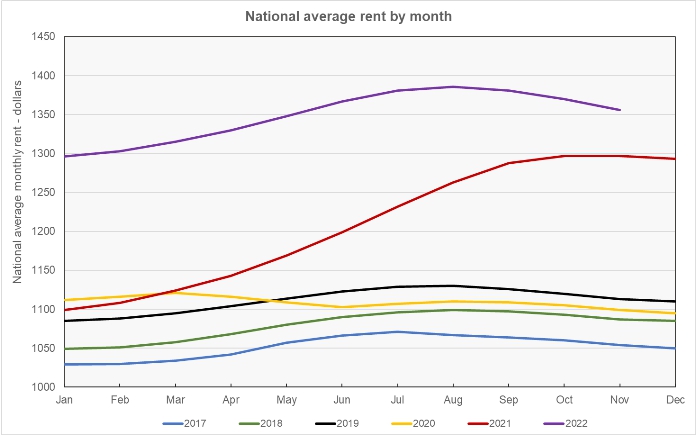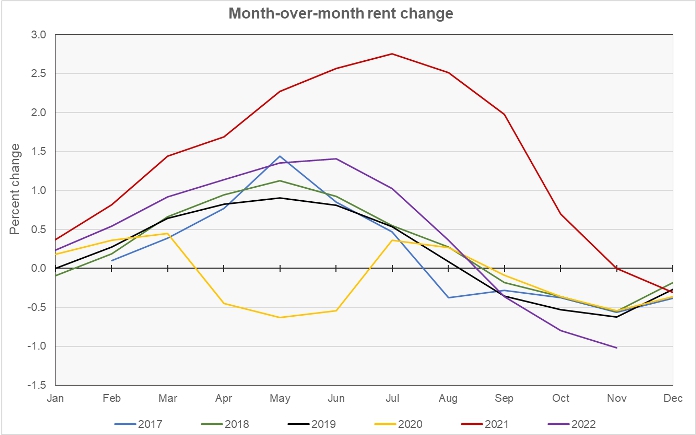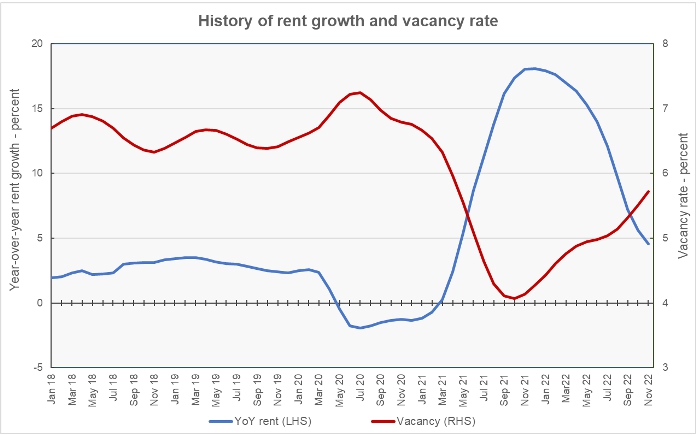The latest rent report from Apartment List shows that the national average rent growth in November remained negative for the third consecutive month. Rents fell 1.0 percent month-over-month. Year-over-year rent growth remained positive, with a 5.7 percent rise.
The pattern of rent growth
The first chart shows the history of the national average rent level since 2017. It is plotted year-by-year so that the annual change pattern is visible. The chart also shows the growth in the national average rent in 2022 through November. The chart shows that rents in 2022 are following the seasonal pattern of the pre-pandemic years, only more so. The increase in rents from January to July was larger than those seen from 2017 through 2019, but the late-year decline now being experienced is also steeper.

The next chart shows the month-over-month rent growth each year in the Apartment List data set. The chart shows the trend discussed above. From January through August, the month-over-month rates of increase in rents in 2022 generally exceeded those of any year except 2021. However, the month-over-month rates of decline in rents for the last two months has been greater than in any prior year in Apartment List’s data set.

The final chart shows the year-over-year rate of rent growth since January 2018 plotted along with the national average apartment vacancy rate. It shows how rents and vacancies were impacted in the wake of the pandemic, first negatively and then positively. It also shows the recent trend of both rents and vacancies seeming to be returning to their pre-pandemic ranges.

Leaders and trailers
Apartment List provides the underlying data they collected in compiling their report and that data was used to create the tables, below. The tables look at the 50 most populous metropolitan statistical areas defined by the US Census Bureau and identify the top and bottom 10 metros for year-over-year rent growth. The tables provide the average monthly rent in the metro, the metro’s vacancy rate, the annual percentage change in rent (YoY Metro) along with the percentage change from the prior month’s rent level (MoM Metro). They also list the percentage change in rent for the metro area compared to the rent level in February 2020, right before the pandemic struck (Feb 20).
The first table shows the 10 metros with the largest annual rent percentage increases. Only one of the top ten metros for year-over-year rent growth, Indianapolis, saw its rents rise from October to November.
| Metro | Metro Rent | Vacancy | YoY Metro | MoM Metro | Feb 20 |
| San Jose | $2,495 | 5.2 | 7.6 | (1.85) | 1.9 |
| New York | $2,032 | 4.0 | 7.5 | (1.84) | 16.3 |
| San Diego | $2,369 | 4.1 | 7.3 | (1.74) | 31.5 |
| St. Louis | $1,135 | 4.8 | 7.3 | (0.70) | 18.7 |
| Indianapolis | $1,181 | 5.3 | 7.3 | 0.34 | 27.5 |
| Kansas City | $1,195 | 5.4 | 7.2 | (0.75) | 19.5 |
| Louisville | $1,047 | 6.1 | 7.2 | (1.04) | 16.3 |
| Dallas | $1,473 | 6.5 | 6.9 | (1.07) | 25.0 |
| Cincinnati | $1,133 | 4.5 | 6.9 | (0.87) | 26.3 |
| Columbus | $1,241 | 4.3 | 6.8 | (0.80) | 23.6 |
The above table shows that several metros that were at the bottom of the rent growth rankings in 2021, such as San Jose and New York, are now at the top of the year-over-year rent growth rankings. Conversely, the table of rent growth laggards, below, now contains many metros that were at the top of the rent growth rankings in 2021.
The next table shows the 10 metros with the smallest annual rent increases.
| Metro | Metro Rent | Vacancy | YoY Metro | MoM Metro | Feb 20 |
| Las Vegas | $1,516 | 6.7 | (2.9) | (1.04) | 30.4 |
| Phoenix | $1,603 | 6.4 | (1.0) | (0.87) | 31.5 |
| Sacramento | $1,730 | 4.6 | (0.9) | (1.31) | 22.7 |
| Riverside | $1,924 | 4.3 | 0.5 | (1.13) | 33.0 |
| Jacksonville, FL | $1,515 | 6.3 | 0.9 | (0.79) | 33.7 |
| Atlanta | $1,558 | 5.9 | 0.9 | (0.95) | 27.9 |
| Detroit | $1,148 | 5.1 | 1.1 | (1.29) | 18.2 |
| Baltimore | $1,623 | 4.6 | 1.1 | (0.86) | 18.5 |
| Virginia Beach | $1,579 | 4.3 | 1.4 | (1.44) | 24.1 |
| Providence | $1,383 | 4.7 | 1.5 | (2.26) | 26.2 |
The complete Apartment List report covers many more metros. It also provides readers with the opportunity to download their data sets. It can be found here.












